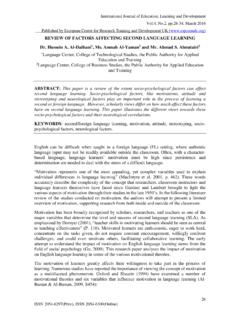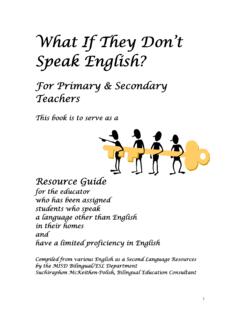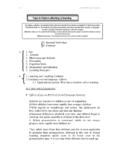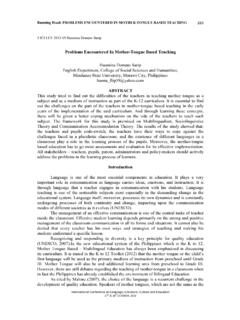Transcription of What Are the Factors Affecting the Use of English Language ...
1 English Language Teaching; Vol. 11, No. 6; 2018 ISSN 1916-4742 E-ISSN 1916-4750 Published by Canadian Center of Science and Education 67 What Are the Factors Affecting the Use of English Language in English -only Classrooms: Student s Perspectives in Pakistan Sadia Asif1, Rahat Bashir1 & Shabana Zafar1 1 Institute of Communication and Cultural Studies, University of Management and Technology, Lahore, Pakistan Correspondence: Sadia Asif, Institute of Communication and Cultural Studies, University of Management and Technology, Lahore, Pakistan.
2 E-mail: Received: February 21, 2018 Accepted: May 10, 2018 Online Published: May 12, 2018 doi: URL: Abstract English as a medium of instruction and communication is becoming a central pedagogy in various countries in the world. In Pakistan, most of the advanced academic institutions use English as their medium of instruction, however students and teachers have been observed communicating in their first languages, especially Urdu, in the classrooms. This study was conducted at the Institute of Communication and Cultural Studies, University of Management and Technology, to examine the Factors that limit students and teachers from communicating in English .
3 Qualitative research methods were employed to find the Factors Affecting the use of English in English -only classrooms. A total of 130 participants were included in this study. Among them, 68 participants were engaged in student questionnaires. The participants were students of four native languages (Urdu, Punjabi, Siraiki and Pushto) with different level of English Language proficiency. Required literature search was performed using key databases and journals, related to applied linguistics, English Language and education.
4 Our results demonstrated that most of the students like to communicate in English and be a part of the English -only environment, however they acknowledged some key Factors that prevented them from speaking English in the classrooms. Fundamental Factors included linguistics, individual, social, psychological and institutional which were largely based upon their beliefs, assumptions, needs and desires. This study may provide insights to the policymakers to work on issues related to communications and medium of instructions in Pakistan.
5 It may also help teachers and educators to understand the underlying Factors that compel students to speak their first languages instead of English . Keywords: medium of instruction, Pakistan; English Language , student s perception, classroom 1. Introduction With the increasing internationalization of higher education, English Medium Instruction (EMI), has become a key module in content and Language integrated learning (CLIL), specially in those countries who want to be part of the global economy. In the 20th century, English Language made a pervasive progress to become a Language of international diplomacy, commerce, education, science and technology.
6 This paradigm shift is on the rise, with significant impact on policy making regarding medium of instructions, however English as a Second Language (ESL) in the classrooms has long been a subject of debate, especially in European and Asian countries (Coyle, 2010; Coleman, 2006; Chan & Tan, 2006). In many instances, student find EMI helpful in improving their English proficiency, however they find it hard to understand English lectures in the classrooms (Chen & Tsai, 2012; Joe & Lee 2013). The use of L1 in the English classroom has been and will remain an issue that everyone has an opinion about, either against or for it.
7 Various studies have shown that students first Language play an important part in the learning of target Language (Lightbown & Spada, 2013; Rivers, 2011), however, there is another school of thought that believes that massive exposure to target Language is required in order to maximize the learning process for the learner (Rawan, 2016). In Pakistan, students and teachers in the English Language classroom tend to hold on to their first Language and most of the time they have been observed speaking Urdu even in their English Language classroom.
8 Most of the studies on the use of L1 in English classrooms usually ignore the viewpoint of the students or highlight only the teachers opinions. Additionally, these studies have been mostly conducted in EFL settings, rather than ESL. In this study, we explore opinions, attitude and reasons of learners regarding their use of native Language when they English Language Teaching Vol. 11, No. 6; 2018 68 are in English Language classroom, a place where English Language is thought to be spoken. This study tries to go deeper in this area and to discover the reasons behind using native Language in ESL settings.
9 Research Aim This is a pilot study and the aim of this study is to give deeper insight why Pakistani students use their mother tongue in English only classrooms. We will investigate and look at nonnative English student s perspective. This study will try to explore student s thoughts and potential reasons for speaking mother tongue instead English , in English Language classrooms. Results from this study will help students to look themselves and find better ideas and explanations for their attitude towards English Language learning. By realizing, they may come up with better solution to enhance their Language skills.
10 This study may also be helpful for the teachers and will enhance their understanding for the problems, faced by their students. It may also provide information for the teachers and educationists in Pakistan on how to generate better materials and methods for the effective use of English in English only classrooms. Theoretical Framework This study will be comprised of a combination of a social constructionist and a constructivist theoretical framework. We will investigate the constructivist aspect to identify social realities that put hindrances to the learning process.


















